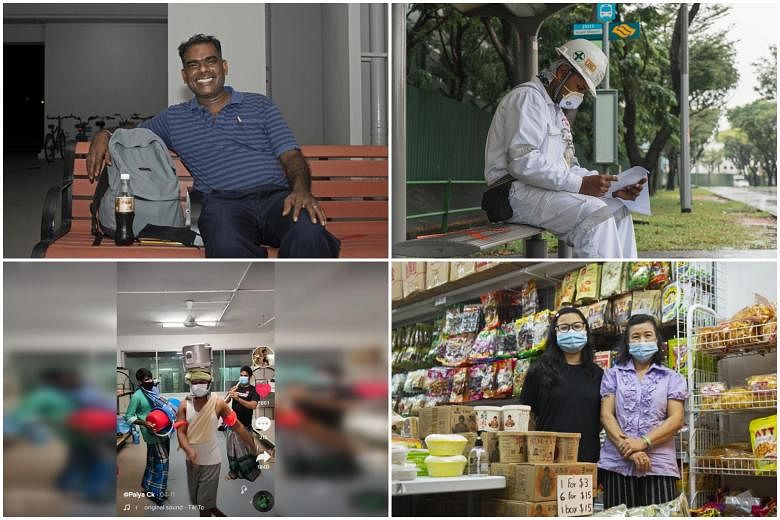SINGAPORE - As the Covid-19 pandemic ravaged the globe and forced border closures, 14 journalism students who would in ordinary times have travelled overseas for a reporting module set their sights on migrant workers at home instead.
They visited dormitories that were once quarantine sites, spoke to workers who were minutes away from flying back to their home countries, and uncovered stories of the men's lives in lockdown.
The students were taking part in Go-Far (Going Overseas for Advanced Reporting), a journalism module of the Wee Kim Wee School of Communication and Information at NTU.
Go-Far is supported by the Wee Kim Wee Legacy Fund.
Team members were Joel Chan, Osmond Chia, Eunice Chua, Jonathan Chew, Nicole Fong, Natasha Ganesan, Mandy Lee, Alvin Lim, Olyvia Lim, Matthew Loh, Tan Nai Lun, Tiffany Tan, Cornelius Tang and Yong Jun Yuan.
Stepping up in a crisis: How migrant workers took on leadership roles during Covid-19

It is almost dawn when Bangladeshi worker Billal Khan, 28, completes his 11-hour night shift on the MRT tracks, installing noise barriers along viaducts, and returns to his factory-converted dormitory.
But his work is not done. At 11am, the senior site supervisor logs on to the Facebook page he created - Overseas Foreign Workers in Singapore. He then reads the news and looks for articles that have been translated into Bengali to decide which to share with his more than 5,000 followers. Some days, he has to translate the news stories himself.
The page, created in April, keeps workers updated on the Covid-19 pandemic and initiatives, such as where they can get free top-up cards.
Veteran migrant workers: Singapore is land of opportunity

When Mr Rahim Islam first arrived in Singapore in 1999, there were just two MRT lines - the North-South and East-West lines.
Then 19, he left his single mother and two sisters in a rented house in Dhaka for a job where he would earn $600 a month as a construction worker. The plan was to return home in five years.
Now, 21 years later, he works as a safety coordinator and earns $4,000. He owns three properties and a plot of land back home.
He keeps estate clean, through Singapore's circuit breaker

April 26 was to be a day of rest. An initiative by the Public Hygiene Council, it was to be CleanSG day, when Singapore would go without cleaners nationwide to raise awareness of littering in estates.
But residents were mandated to stay home that day, and town council cleaners like Mr Shamol Sarker, 23, went to work as usual.
This was the result of the Covid-19 circuit breaker, when most of Singapore came to a standstill, and only a group of essential workers - those providing food, transport, health and social services - were allowed to go to work physically.
From bricks to books: Spending up to $70k on education here to boost career

In a dormitory room in Tuas he shares with 14 other men, Mr Ashraf Rahaman, 25, sits on his bunk bed, listening keenly to his lecturer explain theories of statistics and dynamics.
The scaffolding supervisor is attending his first online class for a diploma in mechanical engineering from Singapore Polytechnic.
His Internet connection is unstable and the streaming gets cut off occasionally but the hiccups do not dampen his enthusiasm.
Staying plugged in: Video app TikTok gives migrant workers a means to stay connected for support

For 10 seconds, a phone camera shakily pans across a scene of snaking queues of mask-clad workers waiting to collect free mobile phone top-up cards at the Woodlands Dormitory carpark.
In the background, a man's voice can be heard saying in Hindi: "Look here at the Singapore government. Because the workers are sitting unoccupied due to the lockdown, (it) has provided them with free data SIM cards."
The video by North Indian safety technician Kumar Ravi, 30, has racked up over a million views on video-sharing platform TikTok since it was posted in early April, when dormitory lockdowns led to migrant workers being quarantined in their room for months.
Change or go bust: amid restrictions, businesses that cater to migrant workers must adapt

Behind shelves of hardware equipment and construction tools hide posters that contain pictures of the Statue of Liberty, the Sydney Opera House and the Singapore Zoo.
In May, Mr Mohammed Shahadat Hossain, 48, turned his former travel agency and photo studio on Desker Road into a hardware store, after Covid-19 crippled the travel industry, hitting his customer base of mainly migrant workers.
About 323,000 migrant workers living in the dormitories were locked down to curb the spread of Covid-19.
Masks, mats and more

Up to thousands of volunteers joined ground-up initiatives in April to help when dormitories went into lockdown, providing workers with everything from masks to prayer mats.
But many groups are unsure if they can keep up their efforts, due to falling donations and fewer volunteers. Others have found solutions such as applying for grants or converting into a social enterprise.
Existing NGOs that have worked more closely with each other said they hope to collaborate more with the Government to come up with long-term solutions for workers.

